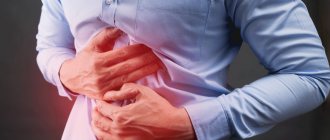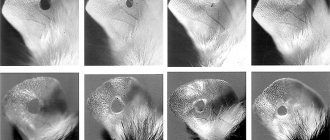Home>Articles>Intestinal disorders after alcohol
quick menu (hide)
- How does alcohol affect the intestines?
- Alcohol and the colon
- Alcohol and the small intestine
- How to cleanse the intestines after alcohol
How alcohol affects the intestines - it all depends on the dose of alcohol. In small quantities, it improves peristalsis and helps soften stool. But with heavy libations, the functioning of the entire gastrointestinal tract is disrupted. Chronic constipation or diarrhea occurs, ulcers form on the walls, beneficial bacteria die, local and then general immunity weakens. All this leads to the development of serious diseases - colitis, enterocolitis, dysbacteriosis.
How does alcohol affect the intestines?
The main component of alcoholic beverages is ethanol. It is synthesized in the lumen of the gastrointestinal tract as a result of the fermentation of carbohydrate foods by beneficial bacteria. This amount is quite enough for the body for the correct course of all biochemical reactions. But when ethanol comes in from outside with alcoholic beverages, the situation changes dramatically. Now ethyl alcohol and its main metabolite acetaldehyde have a toxic effect on the intestines:
- , the main component of the mucus that covers the inner wall of the small and large intestines, protecting them from damage, decreases
- the permeability of biological membranes is impaired . Undigested food remains, pathogenic microorganisms and toxic products of their vital activity easily pass through them;
- against the background of worsening salivation, appetite increases . But it is in the oral cavity that the breakdown of some food products begins. Without treatment with saliva, they enter the digestive tract unprocessed, provoking the development of putrefactive and fermentation processes;
- the intestinal mucous membranes become inflamed . Swelling forms, moisture absorption, absorption of vitamins, micro- and macroelements are disrupted. Clinically, inflammation is manifested by pain in the lower abdomen, burning, and sometimes intestinal colic.
The effect of alcohol on the human intestine is extremely negative. It is not without reason that ethyl alcohol is in demand in industry as a universal solvent for both inorganic and organic compounds. Upon contact with the mucous membranes of the gastrointestinal tract, ethanol dries them out, thins them, and impairs blood circulation. In such conditions, restoration of damaged cells is impossible - irreversible scar changes occur.
Symptoms of alcohol intoxication
Depending on the volume, strength and quality of the alcohol consumed, three stages of intoxication are distinguished:
- change in psycho-emotional state - decreased self-control, liberation, sociability, looseness, positive emotional background. At the same time, the reaction speed decreases, attention is scattered, thinking becomes superficial and inconsistent;
- more severe changes in behavior - inexpressive facial expressions, uncertain movements, difficulty speaking. Critical thinking decreases. Dizziness, headache, and redness of the facial skin may occur. Nausea, frequent urination, and thirst often occur;
- violations of basic functions - coordination of movements, speech. Tremor, perspiration, and constriction of the pupils appear. At the third stage, loss of consciousness and alcoholic coma are common.
Signs of alcohol poisoning usually appear in the second stage. It is important to help a person in a timely manner in order to prevent the condition from worsening and the development of irreversible processes.
Alcohol and the colon
The muscles of the large intestine help move food debris, which turns into feces after water is absorbed. Here, the final breakdown of proteins and the synthesis of vitamins by beneficial bacteria takes place, especially some vitamins B and K. With frequent consumption of alcohol by a person, the smooth flow of natural processes is disrupted :
- the reuptake of fluid in the terminal parts of the intestine is impaired, which leads to constipation and the formation of hard fecal stones;
- the mucous membranes of the rectum become ulcerated, predisposing to the development of proctitis, the formation of anal fissures and hemorrhoids.
Colitis often occurs due to the negative effects of alcohol on the large intestine. This is the name of an inflammatory pathology that occurs with pain, indigestion (constipation, diarrhea), and flatulence. In especially severe cases, perforation of the intestinal wall occurs with the development of peritonitis.
Causes of pain in the stomach area
When consuming alcohol, the first blow from its negative effects is experienced by the digestive system. But during continuous drinking, alcoholic drinks have an analgesic effect, and therefore a person does not initially feel unpleasant symptoms.
But the systematic destructive activity of toxins leads to the following complications:
- increased or decreased secretion of gastric juice;
- damage to mucous membranes;
- reducing the protective properties of walls;
- changes in the blood supply system;
- rapid absorption of toxic substances due to structural pathologies.
All parts of the digestive chain suffer from the harmful effects of ethyl alcohol. If the lower abdomen hurts after a binge, this signals structural changes and dysfunction of the duodenum. Unpleasant sensations in the upper right part indicate inflammatory processes in the gallbladder, in the left - in the pancreas. If there are abnormalities in the liver, painful sensations appear in the right hypochondrium.
The next day after stopping drinking without anesthetic effects, the sensitivity of the mucous membranes is restored, and pain appears in the upper part of the stomach. Constant similar sensations may be a sign of the development of “alcoholic” gastritis.
The cause of bloating after binge drinking is the reaction between complex sugars and yeast that occurs when taking certain intoxicating drinks, such as unfiltered beer or ale. Increased flatulence appears with decreased intestinal motility, gastritis, pancreatitis, liver cirrhosis and other abnormalities in the digestive tract.
When a person already had chronic gastrointestinal diseases, then after riotous days all the symptoms worsen and the disease attacks with a vengeance. All acute conditions require urgent medical intervention.
Alcohol and the small intestine
The small intestine performs a mechanical function throughout its entire length - it pushes the food lump towards the anus. In this organ, all types of nutrients are chemically processed: proteins, fats and carbohydrates. But even small portions of alcohol, especially strong alcohol, can disrupt both peristalsis and digestive processes. What changes in the small intestine occur under its influence :
- absorption of nutrients slows down and then stops, which leads to depletion of the body;
- digestion of food by fermentation, putrefactive or mixed type is disrupted;
- bloating occurs as a result of excess gas formation due to indigestion;
- the production of essential water-soluble vitamins is blocked.
Under such a negative influence of alcohol on the intestines, enterocolitis soon develops - inflammation of the mucous membranes. Its characteristic symptoms are nausea, flatulence, rumbling in the stomach, diarrhea or constipation, and the appearance of mucus and blood in the stool.
Treatment of alcoholism
If a person drinks once a month, then in the absence of gastrointestinal diseases he does not encounter loose stools. This is typical only for binge alcoholics who drink for 10-15 days in a row. The body is under load, so the functioning of all systems is disrupted, and food is not digested. The best way out of the situation is to call a narcologist to your home for detoxification.
Specialists come to clients in an unmarked car and wear casual clothes so that neighbors do not suspect anything. We perform detoxification at home anonymously, and most importantly - effectively and safely for the client. If you wish, you can undergo body cleansing in a hospital, so the result will be even better.
Don't delay calling a doctor if alcohol is ruining your life. Every day the headache will get worse and your health will worsen. Sooner or later, stomach ulcers or liver failure will develop.
To eliminate intoxication and get rid of withdrawal symptoms, seek help from specialists. You can anonymously consult and call a narcologist to your home for detoxification by phone 8 (800) 775-32-63.
Why does dysbiosis occur when drinking alcohol?
Intestinal upset after alcohol does not always go away without a trace after a person stops drinking alcohol. Often diarrhea or constipation takes a chronic course. The thing is that under the influence of alcohol, the intestinal microflora has undergone pathological changes :
- Due to the pronounced aseptic properties of ethanol, beneficial lactic acid bacteria died.
- Pathogenic microorganisms began to actively multiply in the vacated areas.
- Pathogens move up the digestive tract, causing inflammation of the small intestine and stomach.
During the growth process, pathogenic bacteria release toxic substances into the surrounding space. Once they enter the bloodstream, they spread throughout the body, reducing the functional activity of all vital systems. It is not without reason that people who abuse alcohol have problems with their liver, kidneys, gastrointestinal tract, and brain.
IMODIUM® Express for alcoholic diarrhea
According to the instructions, IMODIUM® Express is used for the symptomatic treatment of acute diarrhea of various origins. The drug in the form of lozenges is convenient to use in any life situation. It does not need to be taken with water and can be used even with dysphagia (difficulty swallowing). The active ingredient of IMODIUM® Express is loperamide. This is the first drug with such an active ingredient, patented in 1973. IMODIUM® Express is a well-studied product that has undergone numerous studies confirming its therapeutic effect. This makes the drug different from analogues with the same active substance, on which only bioequivalence studies were carried out. For acute diarrhea, IMODIUM® Express can begin to act within an hour1. Before use, you should consult a specialist and read the instructions.
The information in this article is for reference only and does not replace professional advice from a doctor. To make a diagnosis and prescribe treatment, consult a qualified specialist.
1 Study by Ameri et al. Multicenter, double-blind study: comparing the effectiveness of loperamide for acute diarrhea with two popular antidiarrheal agents and placebo. 1975.
* Among products based on Loperamide. Based on sales in money for February 2022 - January 2022, according to IQVIA (from English IQVIA).
Cleansing the intestines from alcohol and its metabolites
Ethanol is not as dangerous as its metabolites, especially acetaldehyde. It is because of it that the central nervous system is overexcited. A person does not tolerate bright light, loud sounds, and his hands shake. The central nervous system is no longer able to properly regulate the functioning of the gastrointestinal tract, which leads to stagnation of the food bolus and defecation disorders. How to restore the intestines after alcohol :
- drink at least 2.5 liters of liquid - plain water, lightly salted mineral waters (Nagutskaya, Slavyanovskaya, Essentuki No. 2 and No. 4), berry fruit drinks, fruit compotes, vegetable juices;
- exclude fatty meats, rich soups, coffee, legumes, confectionery and sausages from the diet;
- eat more dairy products, fish, dried fruits, fresh fruits and vegetables, and cereals.
Salt or oil enemas will help improve bowel function during constipation. The optimal frequency of treatment procedures is no more than 3 times a week. Proctologists and gastroenterologists also recommend moving a lot, spending less time at the computer and watching TV.
How to eliminate unpleasant symptoms
To speed up the body's recovery after poisoning, you need to follow a diet. Preference is given to low-fat foods, boiled or steamed. The following should be excluded from the diet:
- Spicy, salty, fatty dishes.
- Snacks and fast food.
- Strong tea and coffee.
Additionally, it is recommended to take enterosorbents and medications to normalize the water-salt balance.
Self-medication does not always bring results. It is better to immediately contact a gastroenterologist for tests, ultrasound and FGDS. A complete abstinence from alcohol will be required. This is the only way to stop the destruction of internal organs and forget about intoxication.
Use of Medicines
If your intestines hurt after drinking alcohol, you can take a tablet of any non-steroidal anti-inflammatory drug (Nise, Ketorol) or antispasmodic (No-shpa, Spazmalgon). When dysbiosis becomes the cause of discomfort, you cannot do without a course of taking the following drugs :
- probiotics - Linex, Bifidumbacterin, Lactobacterin, Hilak Forte;
- prebiotics - Duphalac, Normaze, Symbicort.
Alcohol causes a persistent weakening of local immunity, which becomes a trigger for the development of diseases. To strengthen the body's defenses, immunomodulators are used (Immunal, Immunex, Immunorm). For alcohol intoxication, general strengthening balanced vitamin and mineral complexes are useful - Selmevit, Complivit, Centrum, Vitrum.
How addiction is formed
Anyone can become addicted to alcohol: you don’t have to drink strong alcohol to do so. The body reacts to any ethanol-containing drink - alcohol poisoning occurs. Over time, physical cravings develop. The blood alcohol level is the same whether it is 100 grams of vodka or 2 liters of beer.
For each person, the maximum dose of ethanol is individual. The manifestation of the disease is loss of control over drinking. At the same time, there is no critical perception of one’s state when drinking alcohol.
Over time, natural biochemical processes change. Physical cravings are formed when a person constantly needs ethanol. However, this does not happen immediately, but after the onset of psychological dependence. Initially, drinking is needed to overcome complexes or in an attempt to cope with problems or relieve stress. Over time, such a solution becomes the only acceptable one.
Without the opportunity to drink, a person’s mood and well-being worsen. Therefore, the frequency of drinking alcoholic beverages and the dose of ethanol are increasing. The craving for alcohol becomes out of control and pathological. All new doses are needed to overcome withdrawal symptoms, while the pleasure from drinking becomes less and less. The emotional reaction to alcohol-containing drinks changes.
How long do alcoholics live?
The life expectancy of those who suffer from alcoholism is significantly reduced. 20% of patients live more than 50 years. Acute heart failure often causes early death in drunkards under 40 years of age. A dangerous habit is fraught with a significant deterioration in quality and a decrease in life expectancy. The risk of leaving this world prematurely increases. There is no clear answer to the question of how long alcoholics live. Much depends on the age at which a person developed a harmful addiction, whether there are associated problems, etc. That is, the life expectancy of a drinker is determined by the strength of the body. Sudden deaths before age 30 are common. The average life expectancy is 48-55 years. However, this is under fortunate circumstances. 25% of addicted people do not live to reach the specified age mark.
Only by stopping drinking in a timely manner does a person suffering from an illness get a chance to prolong their life. However, in many cases, medical assistance cannot be avoided. Then a person will be able to cope with addiction and get rid of addiction.
Traditional recipes to reduce nausea during a hangover
In the absence of complications, severe pain in the hypochondrium, you can use simple recipes. Many folk remedies reduce discomfort during mild and moderate stages of a hangover and quickly restore a person’s vigor .
At home you can use:
- Brine from pickled or pickled vegetables. It contains natural salts that restore the body in case of dehydration and can help with poisoning.
- Apply a few drops of mint oil and do a light massage. You can inhale it for 2 minutes whenever you gag or the condition worsens.
- For nausea, it is recommended to drink warm rosehip . It prevents the blood from spreading toxins through the tissues, removes ethanol, and maintains vascular tone.
- Relieves discomfort with sour berry juice, bread kvass, fresh smoothies made from cucumber, dill, some fermented milk drinks (airan, whey).
If you feel nauseous after drinking alcohol, you should immediately empty your stomach. This is an important condition for maintaining the body, which prevents the development of intoxication and serious consequences. It is better to limit your diet for a while to relieve additional stress on the pancreas and intestines.
Severe alcohol poisoning: signs and first self-help at home
However, a standard hangover is also formally considered poisoning. In any case, knowing the signs of a hangover means protecting yourself when they appear and preventing a more serious condition. You must know the symptoms themselves in order to provide assistance for alcohol poisoning.
Common signs of severe intoxication/poisoning are:
- Nausea.
- Gagging
- Migraine, point headaches. I feel very dizzy.
- Incoherent speech, wandering eyes, unfocused movements.
- Diarrhea, upset stomach.
- Increased thirst that is difficult to quench.
Help for alcohol poisoning at home: the first and correct stage
Typical symptoms of poisoning will go away naturally if you provide first aid to the victim for alcohol poisoning.
Symptoms of poisoning are divided into normal and dangerous.
Normal ones include:
- Anxiety, state of displeasure, irritation.
- General weakness, chills, fever.
- Rapid heartbeat, pressure changes.
- Strong thirst, dry mouth and skin of hands.
- Severe sweating, swelling of the body, especially the face.
- Minor tremor or noticeable shaking of the body.
- Headache, dizziness, nausea.
- Increased sensitivity to sounds (resonance in the head and pounding in the temples).
- Liquid foamy and foul-smelling stools, constipation.
More dangerous symptoms of alcohol poisoning include:
- Severe pain in the lumbar region that is difficult to relieve.
- Hoarse deep cough with difficulty exhaling, shortness of breath, heavy breathing, lack of oxygen.
- Sudden surges in pressure, failure of cardiac activity with long pauses and freezing of the rhythm.
- Pre-fainting state.
- Hemorrhagic spots on the body (bruises on the body).
- The skin becomes jaundiced and the urine turns brown.
- Bleeding from different places.
- Liver odor from the mouth.
- Impaired orientation in space.
- Collapse (low blood pressure, but at the same time vascular insufficiency).
- A sharp, noticeable tremor of the fingers, reminiscent of the fluttering of a bird's wings.
- Whistling and wheezing breathing with sobs, barking cough, convulsive sighs.
- Ultra-sharp sensitivity to light, sounds, appearance of “spots” before the eyes.
- Retention of urination or involuntary emptying of the bladder, blood in the stool and urine, stools the color of coffee grounds and a runny consistency.
In case of alcohol poisoning, treatment at home should begin with natural cleansing of the body from ethanol breakdown products. In this situation, it is beneficial for the patient to provoke vomiting in order to get rid of excess toxic substances.
The first priority treatment after alcohol poisoning is to cleanse the stomach by vomiting.
HOW TO INDUCE VOMITING CORRECTLY
You need to make sure that the respiratory tract is free of foreign objects, food debris, and vomit. The patient is turned over on his side, his mouth is opened and the oral cavity is examined. Then the person is given 2-3 glasses of water to drink, possibly with salt. Then you need the patient to bend over the toilet or container. Holding it, use your fingers to press on the root of the tongue.
The method of inducing vomiting using potassium permanganate (potassium permanganate) without the advice of a doctor is dangerous! Can cause a burn to the gastric mucosa. It is better to let the person drink a large amount of plain water. Drinking salty tea with milk helps. It is enough to drink 200-400 ml of this tea and a person will vomit, even if he did not feel sick.
If you cannot induce vomiting naturally, medications will help: ipecac root, copper sulfate, apomorphine hydrochloride, and emetic root syrup.
Make sure that the person's tongue is secured when vomiting. Do not leave the patient lying on their back. The tongue may stick into the throat and the person will begin to choke. Choking is also possible due to the person choking on vomit.
After the stomach is cleared, the patient should be placed exclusively on his side.
You need to induce vomiting 1-3 times. The number of times depends on the patient's condition. If it does not improve after the procedure, it is necessary to call emergency help for alcohol poisoning.
Don't be afraid of vomiting bile!!!
If you vomit bile, it means your gallbladder is starting to contract, releasing excess fluid. Then the tension in the bile ducts drops. As a result, pressure on the liver is reduced and pain in the epigastric region is reduced. Next, the bile enters the duodenum, then into the stomach, from where it enters the esophagus and exits along with vomiting. The passage of bile through the stomach leads to the fact that sensations are muffled, the sensitivity of the stomach is reduced, and nausea is suppressed. After 1-3 sessions of vomiting bile, nausea and urges stop. If you still feel nauseous, call your doctor immediately. This means that the poisoning has taken much more serious forms than it seems.
ATTENTION! If there is blood in the vomit, a doctor should be called immediately, and not provoke vomiting again. It is not normal to have blood in the stomach
WHAT TO DO AFTER CLEANSING THE STOMACH?
It is necessary to open the windows or balcony door, ventilate the room so that the patient can breathe easier. In the fresh air, metabolism speeds up and hangovers go away faster.
Then you can do an indirect cardiac massage. If a person's breathing is intermittent or even stops, mouth-to-mouth or mouth-to-nose breathing may have to be performed. If breathing is wheezing or the breath is held for a suspiciously long time, artificial ventilation should not be stopped until the doctor arrives. In this case, you also need to immediately call an ambulance in case of alcohol poisoning.
The second stage is an inpatient detoxification procedure for alcohol poisoning: providing first aid if you are poisoned by alcohol
First of all, you need to cleanse the body of the breakdown products of ethyl alcohol. To begin with (at the first stage), activated carbon tablets are used, which is washed down with plain water. For 10 kg of weight you will need 1 tablet. In case of severe poisoning, the dose is increased by one and a half times. Treatment of alcohol poisoning with activated carbon is the first stage. The next day after poisoning, you can take more coal, the dose should be halved. In addition to coal, there is an excellent adsorbent called polyphepane. It is not very comfortable to take it in powder form, so it is wiser to drink it after poisoning for a week in order to finally remove toxins from all organs of the body, including from the intercellular space.
In case of alcohol poisoning, treatment with drugs and tablets is necessary to relieve the symptoms associated with a hangover.
Swelling and severe thirst can be eliminated if you make the urinary system work more actively and stimulate metabolic processes in cells. The drug "Veroshpiron" will provide such assistance in case of alcohol poisoning. Other diuretics should not be taken. It's better to use natural remedies.
To remove water and speed up metabolic processes, you need to drink more water, green tea, eat watermelons, strawberries, and you can drink non-alcoholic beer.
If you choose between ordinary water and mineral water, Borjomi and Essentuki are better suited. They will help restore the disturbed acid-base balance.
The lack of water in the cells is perceived by the body as thirst. In this case, simple water consumption temporarily increases osmotic pressure, cells shrink from moisture pressure, and there is enough internal water. Then the excess is excreted in the urine, and thirst appears again. This indicates low permeability of cell membranes. You can stimulate it so that water gets inside the cells with rowan infusion or tonic. Water will move freely throughout the body and swelling will subside.
To retain water, which slowly enters the cells, you will need solutions of electrolytes in the blood plasma and chlorides. To increase them in plasma, ordinary table salt is suitable. Cucumber pickle will allow the water you drink to linger in the cells.
Cabbage brine is also suitable, which also contains aspirin, succinic acid and vitamin C, which stop acidosis and speed up metabolism. Sour and sauerkraut are perfect for treating poisoning with alcohol substitutes, since succinic acid helps speed up metabolism and remove remnants of poisons.
In case of liver poisoning by alcohol, treatment consists of taking hepatoprotective drugs, for example, Hepatosar, Sirepan and similar analogues based on animal liver cells. In this case, the intake should be continued even after excess alcohol has been removed from the body.
Medicines to relieve nausea during hangovers
Unpleasant sensations after drinking alcohol are associated with an increased content of toxins . To eliminate the irritant, it is necessary to detoxify and accelerate their elimination with the help of drugs:
- Sorbents. The drugs cleanse tissues of dangerous compounds and improve overall well-being. The most common and recommended are Polysorb, Enterosgel, White Coal.
- Oral rehydration solutions. Eliminate dehydration, improve blood composition. High-quality and simple preparations - Normohydron, Hydrovit, Orsol.
- Diuretics. Excess fluid is removed, causing swelling and pressure on the vestibular apparatus. You can take Veroshpiron, Furosemide or Torasemide.
If a person continues to feel sick the next day, anti-vomiting medications should be used. Tropisetron, Cerucal, Rodavan tablets block the work of the center of the brain responsible for unpleasant sensations. The drug Metocloperamide , which can be taken up to 3 times a day with water.
Some patients can help overcome hangover symptoms with a herbal-based sedative . When you have the urge, you can put a Validol tablet under your tongue: it contains peppermint oil and soothes irritated nerve receptors. The product should not be washed down.
Nausea is the main symptom of alcohol poisoning that you need to pay attention . If an unpleasant feeling occurs during an event, you should not aggravate the situation with another portion of alcohol. It is better to cleanse your stomach and stop drinking alcohol.
You should consult a doctor if the following symptoms and signs of a serious complication appear:
- breathing becomes rare and shallow;
- heart rate decreases;
- the skin turns pale, the nasolabial triangle stands out;
- the patient loses consciousness;
- convulsions occur periodically.
If you experience severe vomiting, you should not self-medicate . In case of repeated urge, complicated by copious secretion of bile, blood or mucus, it is necessary to call an ambulance, or use an anonymous one. If the problem continues for more than one day, a visit to the doctor becomes mandatory.









